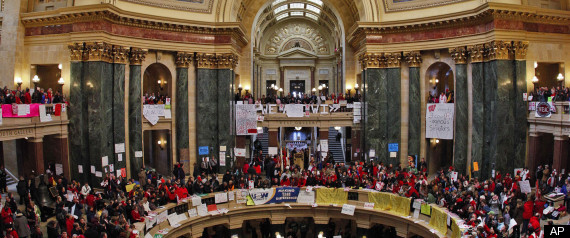"Labour unions offer a bedrock structure for large-scale collective action. Governor Walker is attempting to remove that structure. If he succeeds, internet-mediated organisations won't be able to fill in the gap. Groups like MoveOn.org can be tremendously effective, particularly in the new media environment. But they can't organise workers in a specific industry or city to improve wages, working conditions and benefits. MoveOn is never going to sit across from management at the negotiating table.
Sunday, 27 February 2011
Wisconsin and the limits of web power | Dave Karpf | Comment is free | guardian.co.uk
Web 3.0 Lab: 10% Chance Your Windows Mobile Update Will Have Pr...

"The company had previously said that only a 'small number' of handsets were affected.
"Owners have reported a range of issues following the download, from phones crashing, to becoming completely unusable."
Saturday, 26 February 2011
Google vs Facebook, the big battle

"An update for its latest mobile operating system will see users' Facebook contacts disappear from the phone's address book.
"Google said it took the action as it was no longer willing to exempt Facebook from its data-sharing rules.
"The decision has been seen as indicative of growing tensions between the two internet giants."
Web 3.0 Lab: The Internet down in Bahrain?
Thursday, 24 February 2011
Web 3.0 Lab: Social Network and Web 3.0 services has a large pr...

One of the main social networks in Russia, Odnoklassniki (Одноклассники) is reporting 30 million registered users. The site, which (as the name suggests) connects classmates is used in both Russia and the Ukraine and attracts 8 million visitors each day. VKontakte (В контакте) is Odnoklassniki’s biggest competitor with a reported 28 million registered users and 1.4 billion page views each day and 13.09 million visitors each month.
These statistics are impressive and firmly place Russia as the fourth biggest market in Europe for social networking. The total number of users of both of these sites is remarkable given that in 2008, Russia’s overall internet population was reported to be just 33 million people. It is true that internet access is increasing rapidly in Russia, and the growth of social networks is accompanying this. When people go online for the first time they appear to be joining and using social networks almost immediately."
2nd March 2009, 05:33 pm by Matt Rhodes
Tuesday, 22 February 2011
Pro-Union Website 'Defend Wisconsin' Blocked In Capitol

A website being used to help organize protests against Gov. Scott Walker in Wisconsin has been blocked from the Capitol Building in Madison, according to reports.
The site, http://www.defendwisconsin.org/, was inaccessible from the building on Monday and into Tuesday morning, CNN reported.
Facebook Chat Now Available in Hotmail Inboxes Everywhere
Monday, 21 February 2011
Web 3.0 Lab: WEB 3.0 ANALYSIS: GADDAFI HAS LOST CONTROL OF EAST...

Base upon the start of geotweeting coming out of Benghazi, Libya we a confident that the telecommunication infrastructure in that region is no longer in the hands of the regime, and that Gaddafi must have lost most, if not all, control over much of Eastern Libya.
We have been monitoring Benghazi, Libya for a couple of weeks with out geo-tweeting tool. This tool allows us to follow the density of real time tweeting in Libya or anywhere in the world. Today we saw our first tweets with geotags coming out of Benghazi. We had been looking for this event as we have predicted that he start of geo-located tweeting coming out of Benghazi could only happen once the regime had lost control of the telecommunication infrastructure in the area. Last week we defined this as the event which would show Gaddafi's control in Benghazi had been destroyed.
So the emergence of these first geotagged tweets is a major even in the revolution in Libya.
Sunday, 20 February 2011
Web 3.0 Lab: Web 3.0 Lab: News agencies dependant on User Gener...
As the web3.0 lab can confirm that reporters are relying on user generated content. A long-time BBC correspondent from the region Jon Williams also confirms the story.
"The BBC and other news organisations are relying on those on the ground to tell us what's happening. Their phone accounts - often accompanied by the sound or gunfire and mortars - are vivid. However, inevitably, it means we cannot independently verify the accounts coming out of Libya. That's why we don't present such accounts as "fact" - they are "claims" or "allegations".
"Similarly, the flow of video - the so-called "user-generated-content" - has dwindled to a trickle as the authorities have periodically turned off the Internet. That means we have an additional responsibility - to be clear with our audiences not just what little we do know, but perhaps more significantly, what we don't."
http://www.bbc.co.uk/blogs/theeditors/2011/02/reporting_from_libya.html
Saturday, 19 February 2011
Web 3.0 Lab: Twitter analysis predicted demos in Pearl Roundabout Bahrain
Track tweeting from around Lulu Pearl Roundabout in real time with this tool.